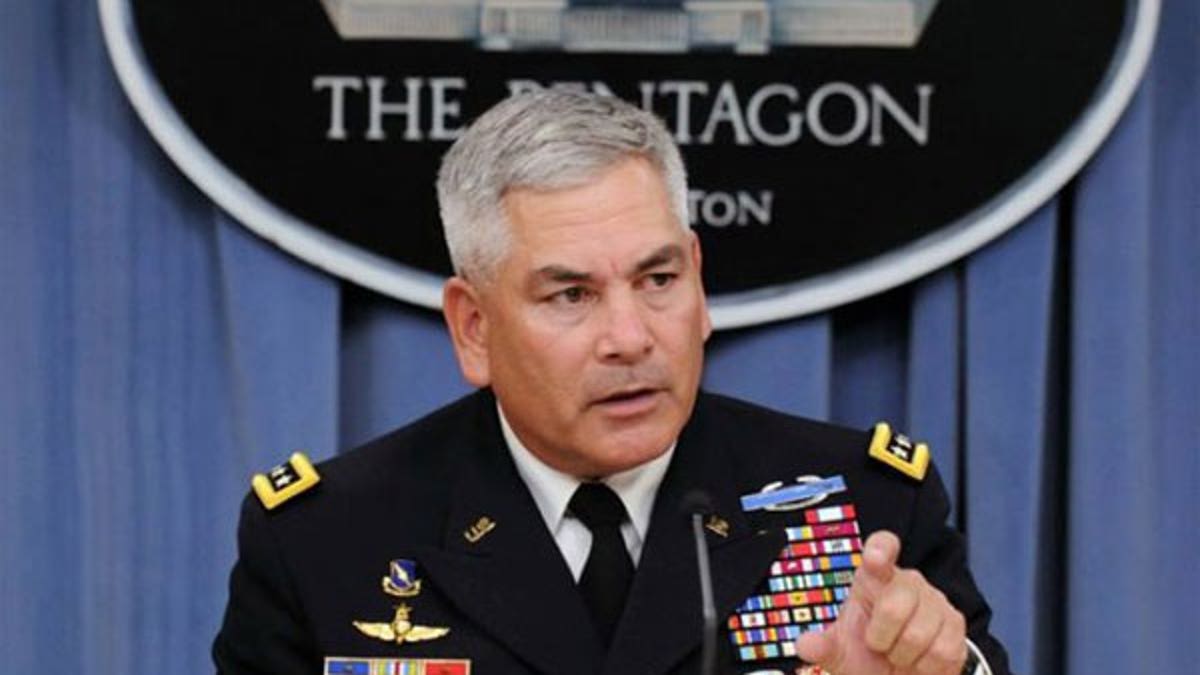
(Military.com)
Army Gen. John F. Campbell, the new commander of U.S. and coalition forces in Afghanistan, will likely not attend the NATO ministers meeting in Britain next week at which the U.S. had hoped to cement final decisions on a future force presence and aid, a U.S. military official in Kabul said Friday.
The official said that the political turmoil in Afghanistan over the runoff election recount on a successor to outgoing President Hamid Karzai would probably preclude Campbell's presence.
Rear Adm. John Kirby, the Pentagon press secretary, said that Afghanistan was still on the agenda for the NATO meetings in Wales on Sept. 4 and 5, but he later said it was unknown whether any representatives of the Kabul government would attend.
In a later conference call with reporters, Charles Kupchan, senior director for European Affairs at the White House National Security Council, said that Afghanistan would be the subject of the first working session of the NATO meeting but he did not know if any Afghans would be present.
"Obviously, we're in a fluid situation on the ground in Afghanistan, and we are trying to work out exactly who will be the representative of Afghanistan at the opening session," Kupchan said. "Obviously, this is a subject of much discussion at the summit so we look forward to finding that out."
U.S. and NATO combat forces were on schedule to withdraw completely from Afghanistan at the end of this year. The U.S. and NATO have been pressing for a new Bilateral Security Agreement that would allow for the presence of about 9,800 U.S. troops and about 4,000 NATO troops next year.
Karzai, who repeatedly has refused to sign a new BSA, has stressed that he will leave office on Sept. 2. Both candidates for president, Abdullah Abdullah and Ashraf Ghani, have said they would sign the BSA once they were inaugurated, but Abdullah earlier this week announced that he was withdrawing from the United Nations-monitored recount.
The U.S. and NATO had hoped to have a new president in place to sign the BSA and make commitments on continued economic support at the Wales meeting which will be attended by President Obama and Defense Secretary Chuck Hagel.
However, the summit of the 25 NATO members will now likely be dominated by efforts to respond to Russian aggression in eastern Ukraine and the threat from the Islamic State of Iraq and the Levant in Iraq and Syria.
Campbell, who was serving his third tour in Afghanistan, formally replaced Marine Gen. Joseph Dunford on Aug. 26 as commander of the International Security Assistance Force.
In his first message to the force, Campbell warned the troops to expect "periods of friction and frustration" in the coming months as the allies attempt to transition to the proposed follow-on force next year.
"We find ourselves at a decisive phase of our campaign," Campbell said in his message. "In the midst of this summer's fighting season, political and security transitions are taking place simultaneously."
In his Senate confirmation hearing in July, Campbell warned that the failure to reach agreement on a new BSA would bring an end to the U.S. and coalition's military presence in Afghanistan.
"If they can't get through this election process coalition forces will not continue to stay there after 2014," Campbell said.
In one of his last acts as ISAF commander, Dunford, who has been confirmed as the next Marine commandant, presided at a ceremony that underlined the difficulties facing Campbell as he seeks to solidify the gains made by the coalition and the Afghan National Security Forces.
Dunford dedicated a building at ISAF headquarters in Kabul to the memory of Army Maj. Gen. Harold J. Greene, the deputy commander of Combined Transition Command-Afghanistan, who was killed in an insider attack on Aug. 5 while visiting a training academy for Afghan troops. Greene was the highest ranking officer killed in a combat zone since the Vietnam War.
"The naming of this building is not to commemorate his death, but rather to remind us of what Maj. Gen. Greene accomplished while he was alive," Dunford said. "He was at the forefront of our main effort, helping Afghans. He was not about telling you what you wanted to hear, but what you needed to."
-- Richard Sisk can be reached at richard.sisk@monster.com

